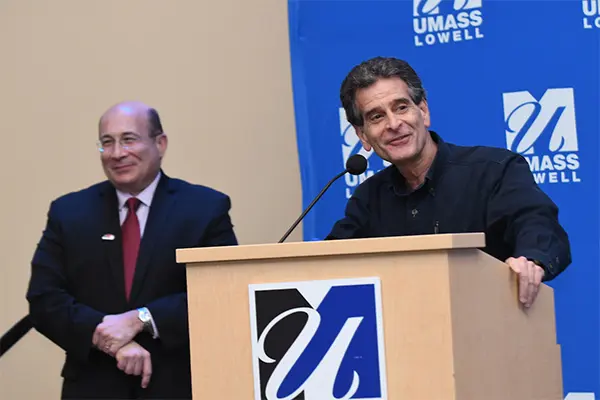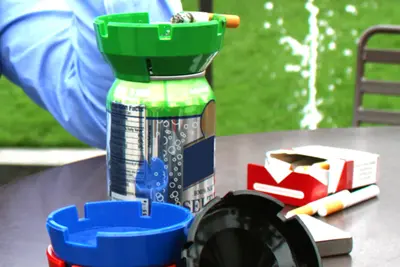CNBC's Insana, Segway's Kamen Share Knowledge

10/15/2018
By David Perry
The fourth annual DifferenceMaker Celebration was twice as good as expected.
Not only did CNBC commentator Ron Insana serve up a helping of witty business talk on the very day the Dow plunged more than 800 points, but Dean Kamen – the New Hampshire-based engineer and Segway inventor – showed up and spoke to the sold-out crowd, too.
First, Insana offered some seasoned perspective on the Dow’s decline.
“It’s pretty rough, but not historic,” Insana said of the 831-point drop. “That’s about three percent.”
Much worse, he noted, was Oct. 19, 1987, which was also his first live reporting experience from the floor of the New York Stock Exchange. The markets plummeted 507 points, which at that time was 23 percent, he said.
One of the worst days in U.S. financial history was also “the right place and the right time for me,” he noted.
Sprinkled with one-liners – “You can bet on the end of the world only once, and if you’re right, you don’t get paid” – Insana’s talk covered his own journey from film major graduate to respected business market analyst.

Some Insana observations:
- ”The first person to live to 150 has been born as a millennial.” He said that has “enormous implications,” including for Social Security. Because people are living longer, “the retirement age needs to be boosted, to 70 for you guys at the very least.”
- The U.S. economy is “pretty strong across the board … in the long run, I’m quite optimistic.”
- The things that have reshaped the U.S. economy include oil. “The fracking revolution dropped prices. Oil was $147 a barrel in 2008, and fell to $26.05 per barrel in 2017. We now have more natural gas than Russia.”
- The tech revolution remade the world. “The iPhone is only 10 years old. I am the proud owner of three millennial children, and in the past three years, my oldest daughter has taken roughly 384,000 selfies, all with the same facial expression.”
- Tech “created more jobs than it destroyed.”
Earlier in the day, Insana met with close to 100 Manning School of Business students for an hourlong discussion at Alumni Hall. Speaking to students from management and finance courses, Insana touched on everything from his experiences with Steve Jobs and Bill Gates as a business journalist to his views on Tesla head Elon Musk’s current imbroglio with the U.S. Securities and Exchange Commission.
Kamen, invited by alum Edward Gallagher ’84, senior vice president and general manager of sales for Comcast’s Northeast Division, was effusive in his praise for UMass Lowell’s graduates.
“I’m here because I’m recruiting,” Kamen, dressed in a bomber jacket and blue jeans, told the crowd. His company has over 100 open engineering positions.
Kamen, who also holds hundreds of patents for drug infusion pump technology and home dialysis machines and was the subject of the documentary “Slingshot,” is currently at work trying to replicate human organs using 3-D printing technology to replace damaged or diseased organs.
He noted the strong reputation of UML’s engineering program.
“Some of the very best project managers I have come from your great engineering school.”
Kamen added that UML grads arrive having everything graduates from big-name, world-renowned schools do.
“Except one thing. An attitude.”
Kamen is a firm believer that engineering experience and knowledge are tools to be used to give back.
“The question used to be, what can I do with technology?” said Kamen. “Now, it’s what should I do with technology?”
That philosophy is in line with the approach of the DifferenceMaker program, said Steven Tello, vice provost for innovation and workforce development. Student teams gather from across disciplines, identify a problem, then take a sustainable solution all the way to market.
That night, a panel of student DifferenceMakers and alumni mentors further showcased the process, discussing what they learned through the process and what has happened since competitions.
Since forming in 2012, 3,259 students have participated in the DifferenceMaker program, resulting in 19 companies. They include Nonspec, formed in 2013 to design, develop and deliver durable, low-cost prosthetics to people in developing nations; eNABLE, which has developed into a volunteer organization producing 3-D printed hands for children around the world; and InvisaWear, whose wearable, personable safety jewelry is taking off. More than $280,000 has been awarded to students during competitions, and teams have gone on to raise more than $1.3 million on their own.




